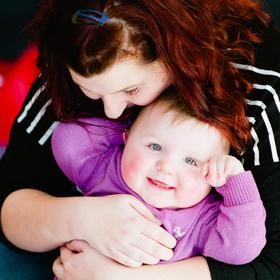Innovation - what does it take?
Over the next few months we will start to test innovative changes to the Family Nurse Partnership (FNP) programme in the next phase of our ADAPT project (Accelerated Design and Programme Testing) – a collaboration with our partners, the Dartington Social Research Unit and 11 FNP sites, and part of FNP Next Steps, our wider innovation and improvement programme.
We are doing this because we want FNP to do even more to improve outcomes for vulnerable families, to improve value for money, and to ensure it meets the needs of those who experience and commission it. The work to get to this point has been challenging and at the same time incredibly rewarding and exciting – here are some of the reasons why.
Being bold
First, we have challenged ourselves to be bold. The world feels uncertain and unpredictable right now. In our own, immediate context of FNP across England, we have faced a perfect storm of severe budget cuts, some challenging evaluation findings and health and social care system changes. Against this background, if we are to really help transform the lives of the most vulnerable in society, we have to do things very differently – doing more of the same a bit harder, quicker and cheaper isn’t likely to work.
The quit smoking adaptation the Dudley FNP site has developed is a great example of how to move away from looking for a silver bullet and instead bring together a range of approaches. They’re developing new clinical materials, changing the FNP visit structure, and introducing peer and family support and input from other local services. As we go forward we also want to explore the potential for using technology well while respecting the importance of face-to-face contact, and think again about the balance of power between service users and service providers.
Importantly, we have also set ourselves a test: whatever we produce needs to have a use beyond FNP, in other early intervention services.
Bold, but not reckless
Secondly, we have dug into the detail and then dug deeper, with rigour. While we want to be bold, we also know much of FNP’s value comes from clear, consistent implementation in line with the long term evidence base and the FNP licence. We want to build on these strong foundations.
A personalisation adaptation will introduce new flexibilities to the current FNP programme structure. We started by creating a detailed and well evidenced conceptual framework, informed by literature, underlying FNP theories, client and nurse experience, and commissioner views. We tested this with nurses and local leaders and the concept became more finely tuned. We ran a process workshop, which started to place the concept in the real world, and we adjusted accordingly. Designing the supporting assessment tool raised new clinical questions. Thinking about the data to collect made us focus even more deeply on the questions we are asking, what we really want to achieve, and added more definition to the concept. And as we implement, test, review and implement again we are bound to go deeper and further.
Stronger together
Finally, all of us involved have developed new, and I think important, relationships. A colleague recently talked about expert worlds colliding. I would say the planets are now starting to align.
Our collaboration includes researchers, family nurses and supervisors, local leaders, FNP National Unit staff and many more. We all brought to the table deep professional and personal histories and ways of seeing the world and we have had to debate, explain, describe, sometimes argue, and compromise. The comment in this King's Fund blog about co-production rings very true – that sometimes “we stumble and hurt each other’s feelings – but still we all get back up and try again, because we all care about getting things right”. The best moments have been when, as a result of honest and sometimes difficult discussion, we have found new ways of seeing. This is really the point, and is at the heart of creating any real change.
The role of failure in success
It feels like we are collectively breaking new ground. We are carefully and methodically finding different ways, underpinned with rigorous analysis, to tackle some real, entrenched social problems. Alongside this is a sense of discovery. I have learned to expect the unexpected – and even then I am still taken by surprise, often.
A collaborative process means giving others the power to suggest, advocate and run with things you might not have planned or even dreamed of. Digging deep means really hard learning.
And being bold means also living with a willingness to fail – and to embrace that failure honestly, but without blame and with the confidence to learn. As we move into a rapid cycle testing phase, that will be really important. After all, it took James Dyson 5,127 attempts to make his ground-breaking bagless vacuum cleaner, but he eventually did it and revolutionised an entire industry.
By Ailsa Swarbrick, FNP National Unit Director
